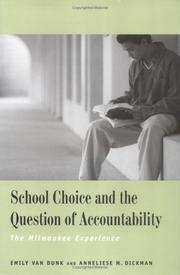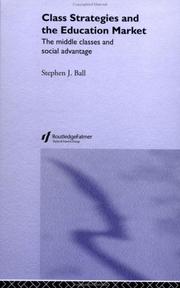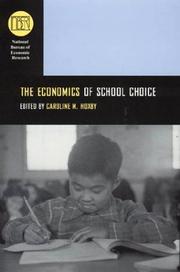| Listing 1 - 3 of 3 |
Sort by
|

ISBN: 1281729876 9786611729875 0300127979 9780300127973 9780300099423 0300099428 9781281729873 6611729879 Year: 2003 Publisher: New Haven Yale University Press
Abstract | Keywords | Export | Availability | Bookmark
 Loading...
Loading...Choose an application
- Reference Manager
- EndNote
- RefWorks (Direct export to RefWorks)
This timely book refocuses the debate about school choice programs with a nonpartisan assessment of the nation's largest and longest-running private school voucher program-the high profile Milwaukee experiment-and finds that the system undercuts the promise of school choice.The authors argue that the Milwaukee experiment has not resulted in the one element necessary for school choice to be effective: an accountability system in which good schools thrive and poor schools close. They show that most ingredients of a robust market are missing. Well-informed consumers (parents) are not the norm. State fiscal incentives are counterproductive, and competition among public and choice schools is difficult to discern. They conclude that school choice could succeed if certain conditions were met, and they offer guidelines to strengthen accountability and repair the voucher system.
School choice --- Educational accountability --- Accountability in education --- Responsibility --- Educational indicators --- Educational productivity --- Choice of school --- Parents' choice of school --- School, Choice of --- Schools --- Education --- Selection

ISBN: 020329517X 1280070242 0203218957 1134483538 9780203218952 0415272769 9780415272766 0415272777 9780415272773 9786610070244 6610070245 9781134483488 9781134483525 9781134483532 113448352X Year: 2003 Publisher: London ; New York : RoutledgeFalmer,
Abstract | Keywords | Export | Availability | Bookmark
 Loading...
Loading...Choose an application
- Reference Manager
- EndNote
- RefWorks (Direct export to RefWorks)
Modern state education was essentially formed around the needs and interests of the middle class. The middle classes are currently very much at the centre of all politicians' electoral concerns. Nevertheless sociological and educational research has tended to neglect the middle class. Class Strategies and the Education Market examines the ways in which the middle classes maintain and improve their social advantages in and through education. Drawing on an extensive series of interviews with parents and children, this book identifies key moments of decision making in the construction of the educational trajectories of middle class children. Stephen J. Ball organises his analysis around the key concepts of social closure, social capital, values and principles and risk, while bringing a broad range of up-to date sociological theory to bear upon his subject. From this thorough analysis, valuable and thought-provoking insights into the assiduous care and considerable effort and expenditure which goes into ensuring the educational success of the middle class child, emerge. The middle classes are a sociological enigma, presenting the social researcher with considerable analytic and theoretical difficulties. Class Strategies and the Education Market provides a set of working tools for class analysis and the examination of class practices. Above all, it offers new ways of thinking about class theory and the relationships between classes in late modern society.
School choice --- Social classes --- Education --- Choice of school --- Parents' choice of school --- School, Choice of --- Schools --- Social aspects --- Selection --- School choice - Great Britain --- Social classes - Great Britain --- Education - Great Britain - Social aspects

ISBN: 0226355330 9786611125738 1281125733 0226355349 9780226355344 9780226355337 9781281125736 6611125736 Year: 2003 Publisher: Chicago University of Chicago Press
Abstract | Keywords | Export | Availability | Bookmark
 Loading...
Loading...Choose an application
- Reference Manager
- EndNote
- RefWorks (Direct export to RefWorks)
Now that the U.S. Supreme Court has declared school voucher programs constitutional, the many unanswered questions concerning the potential effects of school choice will become especially pressing. Contributors to this volume draw on state-of-the-art economic methods to answer some of these questions, investigating the ways in which school choice affects a wide range of issues. Combining the results of empirical research with analyses of the basic economic forces underlying local education markets, The Economics of School Choice presents evidence concerning the impact of school choice on student achievement, school productivity, teachers, and special education. It also tackles difficult questions such as whether school choice affects where people decide to live and how choice can be integrated into a system of school financing that gives children from different backgrounds equal access to resources. Contributors discuss the latest findings on Florida's school choice program as well as voucher programs and charter schools in several other states. The resulting volume not only reveals the promise of school choice, but examines its pitfalls as well, showing how programs can be designed that exploit the idea's potential but avoid its worst effects. With school choice programs gradually becoming both more possible and more popular, this book stands out as an essential exploration of the effects such programs will have, and a necessary resource for anyone interested in the idea of school choice.
School choice --- Educational vouchers --- Economic aspects --- Educational vouchers. --- Educational vouchers - United States. --- School choice - Economic aspects - United States. --- School choice. --- Education --- Social Sciences --- Theory & Practice of Education --- Choice of school --- Parents' choice of school --- School, Choice of --- Schools --- Selection --- economy, money, wealth, income, class, education, educational, schooling, k12, contemporary, 20th century, supreme court, united states, usa, american, america, constitutional, voucher, program, essay collection, research, analysis, economics, market, achievement, productivity, students, teachers, special ed, financing, equality, inequality, charter, district.
| Listing 1 - 3 of 3 |
Sort by
|

 Search
Search Feedback
Feedback About UniCat
About UniCat  Help
Help News
News